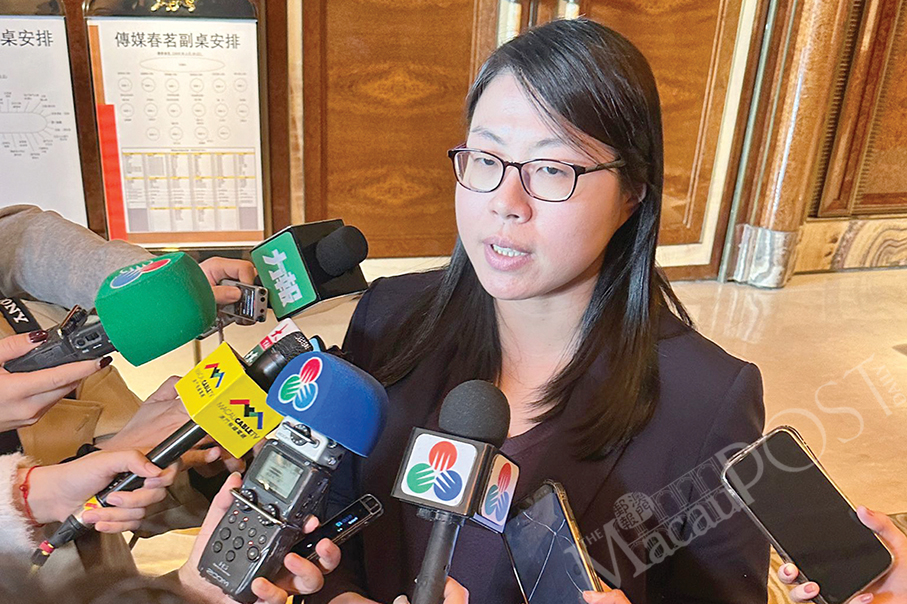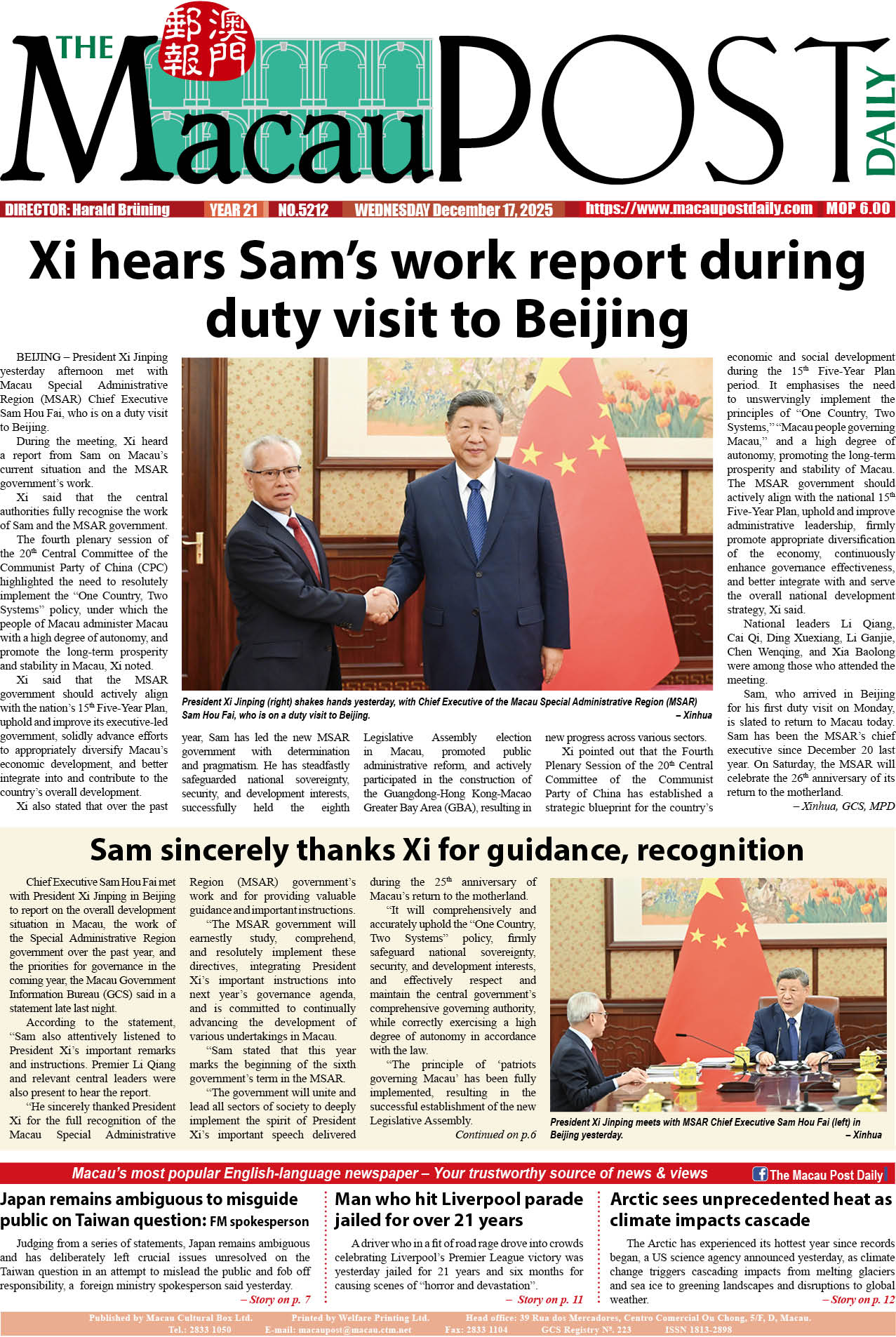Editorial
Secretary for Economy and Finance Lei Wai Nong’s announcement last week that next year – irrespective of the adverse impact of the COVID-19 pandemic on the local economy – the government will stick to its 12-year-long practice of paying residents’ annual wealth-sharing handout in cash has once more proven the validity and vitality of the age-old saying that “cash is king”.
The popular phrase symbolises the common man and woman’s deeply ingrained conviction that cold cash is superior to other kinds of assets or forms of payment, particularly in times of crises such as during the current pandemic.
That’s why, unsurprisingly, Friday’s announcement in the legislature’s hemicycle by Macau’s top economic affairs official has been welcomed by almost everyone I have asked about it, irrespective of their ethnic, financial and professional background.
Earlier this month, Chief Executive Ho Iat Seng’s 2021 Policy Address ventilated the idea of replacing the cash handout with another top-up of residents’ consumption subsidy smartcards. However, he was wise enough to pledge that he would gauge public opinion on the matter. Well, the informal opinion poll reaffirmed what many had expected: an overwhelming preference for hard cash.
Interestingly enough, a vox pop carried out by this newspaper a fortnight ago showed that some citizens wouldn’t have minded getting next year’s handout in the form of a consumption smartcard top-up. Perhaps the respondents had second thoughts about the matter.
The cash handout, which was launched by the government in 2008, is certainly one of the most popular measures that the local government has ever come up with – and it has been “copied” by its counterparts elsewhere such as in Hong Kong and beyond. Even many Western governments have responded to the trough caused by the novel coronavirus crisis by handing out “ready money” to their citizenry. Not long ago some local analysts used to turn up their noses at Macau’s annual cash handouts, slamming them as a scattershot approach towards public spending. For our low-income strata, which in my estimation amount to about one-fifth of local residents, the annual handout has become an eagerly awaited grant to replenish their meagre wallets. For middle-classers and even big earners the cash handout has become their symbolic partaking in the wealth generated by the city they call home, even though they are not dependent on the dough coughed up by the public coffers. Symbolism plays an important role in politics – everywhere.
In Friday’s Q&A session, Lei urged the cash handout’s beneficiaries to spend the cash in Macau, giving them the pertinent advice that “our consumption is directly related to our rice bowl” and reminding them that by spending the 10,000 patacas (for permanent residents) or 6,000 patacas (for non-permanent residents) locally, preferably on the products and services offered by small- and medium-sized enterprises (SMEs), they will be implicitly supporting themselves and their friends and helping each other keep their jobs.
Diversification challenge
Quite rightly, Lei also called for the diversification of Macau’s tourism industry – a concept known as “tourism+” – such as by developing new tourism derivatives and creating synergies in the areas of shopping, entertainment and the MICE (meetings, incentives, conventions and exhibitions) as well as culinary and sports tourism.
I believe that shopping tourism has, at least in the short- and medium-term, the best development prospects. Some two decades ago I would never have predicted our retail sector to reach the dimension that it enjoys now (well, at least prior to the COVID-19 pandemic that has severely affected the local economy since early this year), based on Macau’s status as a separate customs territory (Macau is even a founder member of the World Trade Organisation/WTO), free port and low-tax jurisdiction (consumers in Macau are lucky enough not to have to pay the regressive value-added tax/VAT). I have been told by retailers that nowadays many mainlanders visit Macau primarily for shopping, and that gambling for them is just playing a second fiddle.
Of course, we must be realistic enough to accept the fact that Macau’s over three dozen casinos are our geese laying golden eggs. Without them Macau would never have been able to pile up over 600 billion patacas in financial reserves that are now helping us get through the COVID-19 crisis relatively unscathed. But I believe that it’s even in the interest of our golden-egg-laying geese to diversify Macau’s economy to reduce the latter’s overdependence on just one “mode of production” (as Karl Marx called it).
Consequently, Macau must continue to diversify its economy without, however, throwing the baby out with the bathwater. The approach must be realistic, gradual and careful – and the latter particularly concerns, in my opinion, the possible setting-up of a Macau securities exchange, here or in Hengqin, as it would require immense professional expertise and, last but not least, investors’ complete trust to be successful. A short-lived attempt to set up a stock exchange in Macau some 30 years ago came a cropper.
Macau’s economy is nowadays much less diversified than in the not-too-distant past. For instance, in the 1960s Macau had a thriving firecracker industry which was one of the biggest in the world, and until the mid-1990s Macau had a relatively wide range of manufacturing industries such as artificial flowers, textiles, garments and toys thanks to favourable conditions created by the Multi Fibre Agreement (1974-1994) which was succeeded by the Agreement on Textiles and Clothing (ATC) that expired in 2005, as well as the Generalised System of Preferences (GPS). Macau once had one of the highest per capita clothing production rates in the world, and its range of products even included cameras.
Since the establishment of the Macau Special Administrative Region (MSAR) in 1999, the central government has repeatedly called for the “adequate”* diversification of Macau’s economy. I am sure that Beijing is fully aware of the fact that Macau’s “moderate”* diversification is no mean feat. The development of a traditional Chinese medicine (TCM) hub in Macau/Hengqin appears to be one of the ways to move the diversification process forward over the next few years, while laying the groundwork for turning Macau into a sci-tech and fintech centre in the Greater Bay Area (GBA) is still in an embryonic stage.
Well, let’s be patient but optimistic…
* The Chinese term 適度 (“shidu” in pinyin) can be translated as “adequate”, “moderate”, “appropriate” or “proper”, according to the New Century Edition Chinese-English Dictionary.
– Harald Brüning







